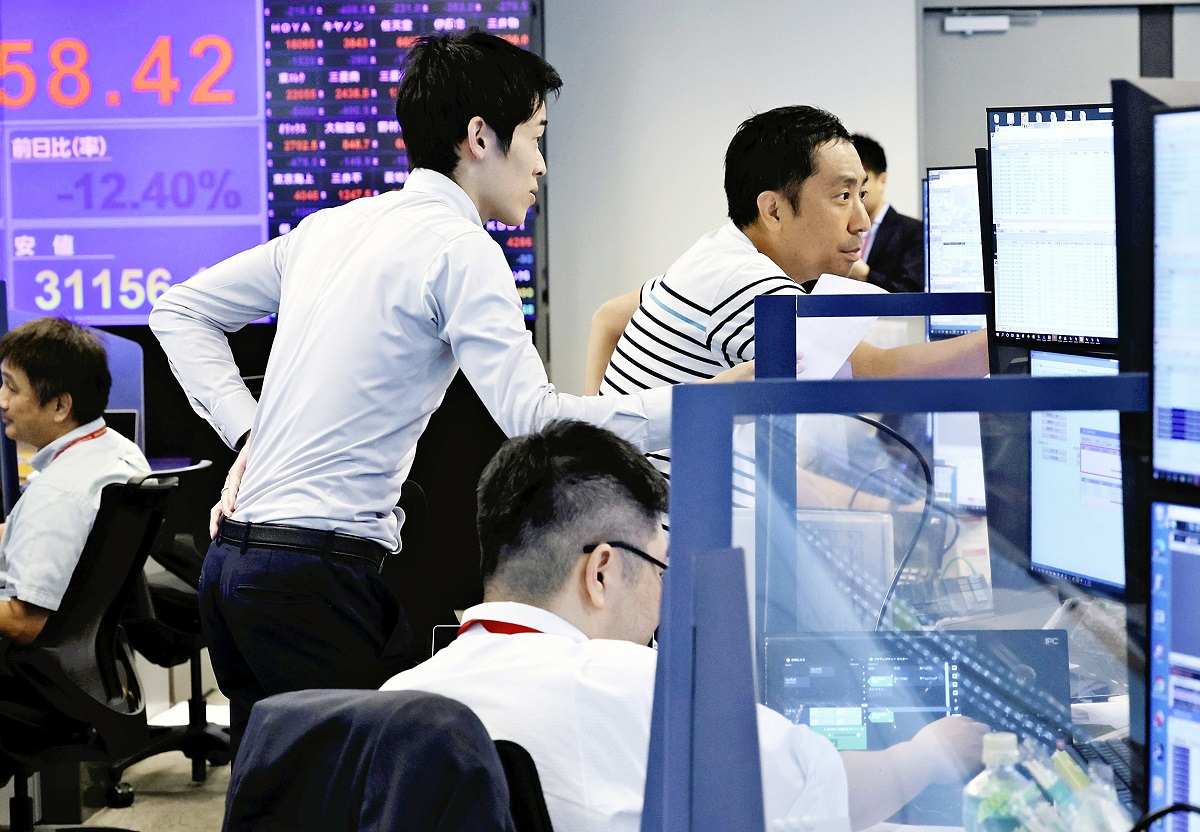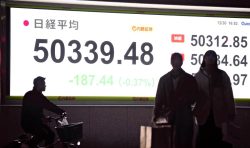Selling Spurred Selling Monday in Tokyo as Investors Panicked; Nikkei Index Lost Over 7,600 Points in 3 Trading Days

Officials at a securities company deal with a sharp drop in the Nikkei 225 index in the company’s trading room Monday afternoon in Chiyoda Ward, Tokyo.
18:02 JST, August 6, 2024
The Tokyo stock market was deeply shaken Monday by a combination of concerns about a U.S. economic slowdown, falling U.S. stock prices and the surging yen.
The benchmark Nikkei 225 index plunged 4,451 points, the biggest single-day point loss in history and exceeding the drop on so-called Black Monday in 1987. Investors sold their holdings in a panic and the growth in the Nikkei index, which had continued since the beginning of this year, evaporated.
“Someone screamed ‘Fire!’ in a crowded theater, and everyone fled at once,” said Shingo Ide, a chief financial engineer at the NLI Research Institute, explaining that selling triggered more selling Monday due to the group psychology of investors.
Last week, the Nikkei index saw sharp declines of 975 points on Thursday and 2,216 points on Friday. Including Monday’s loss, the Nikkei lost over 7,600 points in three trading days.
Monday’s plunge was triggered by the release Friday of disappointing U.S. jobs data for July. Nonfarm payrolls were significantly lower than market expectations, while the unemployment rate increased.
Many market players expected the U.S. economy to have a soft landing, in which inflation would ease without a serious economic slowdown. However, the latest U.S. jobs data apparently caused some investors to fear a hard landing and rush to sell their holdings. The Dow Jones Industrial Average on Friday closed down 610 points, the largest decline of the year
On Monday, the slump in U.S. stocks sent shockwaves through the entire world. All major Asian stock indices fell and stocks in South Korea and Taiwan plunged more than 8%. Following the sharp drop in the Tokyo stock market, a major European stock index temporarily fell by over 3%.
Money invested in stocks has been moved into government bonds, which are considered a comparatively safe asset. The prices of Japanese and U.S. government bonds increased, resulting in a plunge in long-term interest rates that are inversely correlated with bond prices.
Tailwinds turn into headwinds
The Nikkei stock average had continued to rise since the beginning of this year and hit a record high in February for the first time in about 34 years. The index reached an all-time peak of 42,224 on July 11.
There were three tailwinds for Japanese stocks: (1) the strong U.S. stock market, such as the Dow Jones Industrial Average and Nasdaq Composite that continued to set new records; (2) the semiconductor stock boom represented by Nvidia and; (3) the depreciation of the yen.
The weak Japanese currency, which remained weaker than ¥150 per U.S. dollar, particularly led investors to think that Japanese stocks were undervalued and helped attract foreign investors.
However, these tailwinds suddenly turned into strong headwinds.
The weaker-than-expected U.S. jobs data prompted a sharp drop in U.S. stock prices. While generative AI had caused a dramatic increase in semiconductor stock prices, its profitability is now being questioned.
As the Bank of Japan decided to raise its short-term interest rate target at the end of July and the U.S. Federal Reserve is expected to cut interest rates in September, the yen rapidly appreciated against the U.S. dollar. On Monday, the Japanese currency temporarily appreciated by nearly ¥8 from Friday. Amid these circumstances, foreign investors no longer believe that Japanese stocks are undervalued.
The performance of Japanese companies that are active abroad has been partly supported by the strong U.S. economy and the weak yen. Their stock prices, which had grown beyond their true value, quickly returned to their original levels.
Impact on consumption
“The U.S. economy, which has been strong so far, is now showing signs of slowing, and this reversed the situation where the yen was weak against the U.S. dollar and stock prices were high. Now, the yen is rising and stock prices are falling,” said Masayuki Kubota of Rakuten Securities Economic Research Institute.
If the yen continues to appreciate and stock prices remain low, what impact will it have on the Japanese economy?
The strong yen often has a negative impact on the performance of exporting companies. According to SMBC Nikko Securities Inc., if the yen appreciates by ¥1 against the U.S. dollar, it lowers the operating income of major companies by 0.6%.
On the other hand, since the strong yen helps reduce import costs and ease inflation, households can expect a decline in prolonged high prices.
This year, the new Nippon Individual Savings Account (NISA) program began and many individual investors started to invest in stock markets. If stock prices remain low, assets possessed by individuals may shrink, which could result in lower consumption.
“The sharp decline in stock prices may cause investors to panic,” said Yusuke Shimoda, a chief researcher at the Japan Research Institute Ltd. “However, long-term accumulation is a basic element of asset building, so we can view the current situation as an opportunity to buy stocks at lower prices.”
Top Articles in Business
-

Prudential Life Insurance Plans to Fully Compensate for Damages Caused by Fraudulent Actions Without Waiting for Third-Party Committee Review
-

Narita Airport, Startup in Japan Demonstrate Machine to Compress Clothes for Tourists to Prevent People from Abandoning Suitcases
-

Japan, U.S. Name 3 Inaugural Investment Projects; Reached Agreement After Considerable Difficulty
-

JR Tokai, Shizuoka Pref. Agree on Water Resources for Maglev Train Construction
-

Toyota Motor Group Firm to Sell Clean Energy Greenhouses for Strawberries
JN ACCESS RANKING
-

Japan PM Takaichi’s Cabinet Resigns en Masse
-

Japan Institute to Use Domestic Commercial Optical Lattice Clock to Set Japan Standard Time
-

Israeli Ambassador to Japan Speaks about Japan’s Role in the Reconstruction of Gaza
-

Man Infected with Measles Reportedly Dined at Restaurant in Tokyo Station
-

Videos Plagiarized, Reposted with False Subtitles Claiming ‘Ryukyu Belongs to China’; Anti-China False Information Also Posted in Japan





















